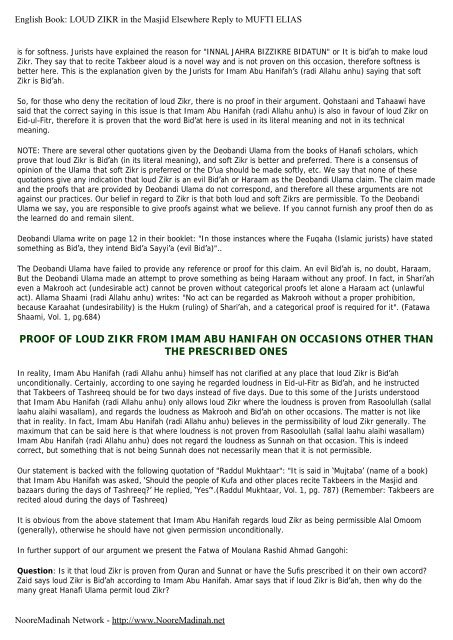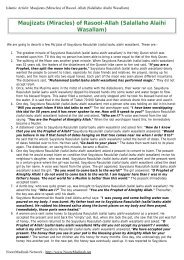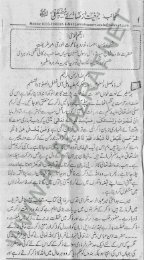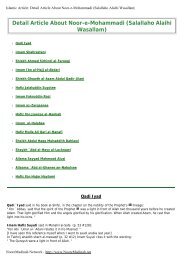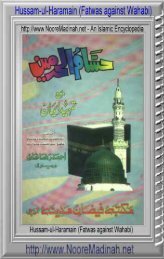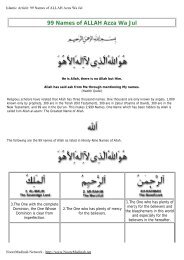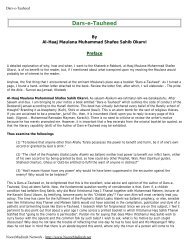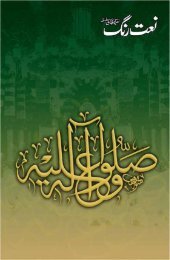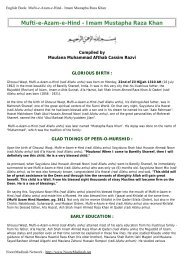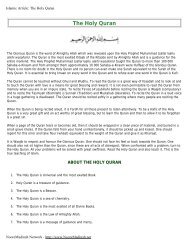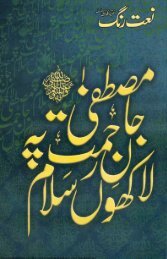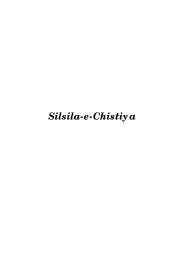LOUD ZIKR in the Masjid & Elsewhere & Reply to MUFTI ELIAS
LOUD ZIKR in the Masjid & Elsewhere & Reply to MUFTI ELIAS
LOUD ZIKR in the Masjid & Elsewhere & Reply to MUFTI ELIAS
You also want an ePaper? Increase the reach of your titles
YUMPU automatically turns print PDFs into web optimized ePapers that Google loves.
English Book: <strong>LOUD</strong> <strong>ZIKR</strong> <strong>in</strong> <strong>the</strong> <strong>Masjid</strong> <strong>Elsewhere</strong> <strong>Reply</strong> <strong>to</strong> <strong>MUFTI</strong> <strong>ELIAS</strong><br />
is for softness. Jurists have expla<strong>in</strong>ed <strong>the</strong> reason for "INNAL JAHRA BIZ<strong>ZIKR</strong>E BIDATUN" or It is bid’ah <strong>to</strong> make loud<br />
Zikr. They say that <strong>to</strong> recite Takbeer aloud is a novel way and is not proven on this occasion, <strong>the</strong>refore softness is<br />
better here. This is <strong>the</strong> explanation given by <strong>the</strong> Jurists for Imam Abu Hanifah’s (radi Allahu anhu) say<strong>in</strong>g that soft<br />
Zikr is Bid’ah.<br />
So, for those who deny <strong>the</strong> recitation of loud Zikr, <strong>the</strong>re is no proof <strong>in</strong> <strong>the</strong>ir argument. Qohstaani and Tahaawi have<br />
said that <strong>the</strong> correct say<strong>in</strong>g <strong>in</strong> this issue is that Imam Abu Hanifah (radi Allahu anhu) is also <strong>in</strong> favour of loud Zikr on<br />
Eid-ul-Fitr, <strong>the</strong>refore it is proven that <strong>the</strong> word Bid’at here is used <strong>in</strong> its literal mean<strong>in</strong>g and not <strong>in</strong> its technical<br />
mean<strong>in</strong>g.<br />
NOTE: There are several o<strong>the</strong>r quotations given by <strong>the</strong> Deobandi Ulama from <strong>the</strong> books of Hanafi scholars, which<br />
prove that loud Zikr is Bid’ah (<strong>in</strong> its literal mean<strong>in</strong>g), and soft Zikr is better and preferred. There is a consensus of<br />
op<strong>in</strong>ion of <strong>the</strong> Ulama that soft Zikr is preferred or <strong>the</strong> D’ua should be made softly, etc. We say that none of <strong>the</strong>se<br />
quotations give any <strong>in</strong>dication that loud Zikr is an evil Bid’ah or Haraam as <strong>the</strong> Deobandi Ulama claim. The claim made<br />
and <strong>the</strong> proofs that are provided by Deobandi Ulama do not correspond, and <strong>the</strong>refore all <strong>the</strong>se arguments are not<br />
aga<strong>in</strong>st our practices. Our belief <strong>in</strong> regard <strong>to</strong> Zikr is that both loud and soft Zikrs are permissible. To <strong>the</strong> Deobandi<br />
Ulama we say, you are responsible <strong>to</strong> give proofs aga<strong>in</strong>st what we believe. If you cannot furnish any proof <strong>the</strong>n do as<br />
<strong>the</strong> learned do and rema<strong>in</strong> silent.<br />
Deobandi Ulama write on page 12 <strong>in</strong> <strong>the</strong>ir booklet: "In those <strong>in</strong>stances where <strong>the</strong> Fuqaha (Islamic jurists) have stated<br />
someth<strong>in</strong>g as Bid’a, <strong>the</strong>y <strong>in</strong>tend Bid’a Sayyi’a (evil Bid’a)"..<br />
The Deobandi Ulama have failed <strong>to</strong> provide any reference or proof for this claim. An evil Bid’ah is, no doubt, Haraam,<br />
But <strong>the</strong> Deobandi Ulama made an attempt <strong>to</strong> prove someth<strong>in</strong>g as be<strong>in</strong>g Haraam without any proof. In fact, <strong>in</strong> Shari’ah<br />
even a Makrooh act (undesirable act) cannot be proven without categorical proofs let alone a Haraam act (unlawful<br />
act). Allama Shaami (radi Allahu anhu) writes: "No act can be regarded as Makrooh without a proper prohibition,<br />
because Karaahat (undesirability) is <strong>the</strong> Hukm (rul<strong>in</strong>g) of Shari’ah, and a categorical proof is required for it". (Fatawa<br />
Shaami, Vol. 1, pg.684)<br />
PROOF OF <strong>LOUD</strong> <strong>ZIKR</strong> FROM IMAM ABU HANIFAH ON OCCASIONS OTHER THAN<br />
THE PRESCRIBED ONES<br />
In reality, Imam Abu Hanifah (radi Allahu anhu) himself has not clarified at any place that loud Zikr is Bid’ah<br />
unconditionally. Certa<strong>in</strong>ly, accord<strong>in</strong>g <strong>to</strong> one say<strong>in</strong>g he regarded loudness <strong>in</strong> Eid-ul-Fitr as Bid’ah, and he <strong>in</strong>structed<br />
that Takbeers of Tashreeq should be for two days <strong>in</strong>stead of five days. Due <strong>to</strong> this some of <strong>the</strong> Jurists unders<strong>to</strong>od<br />
that Imam Abu Hanifah (radi Allahu anhu) only allows loud Zikr where <strong>the</strong> loudness is proven from Rasoolullah (sallal<br />
laahu alaihi wasallam), and regards <strong>the</strong> loudness as Makrooh and Bid’ah on o<strong>the</strong>r occasions. The matter is not like<br />
that <strong>in</strong> reality. In fact, Imam Abu Hanifah (radi Allahu anhu) believes <strong>in</strong> <strong>the</strong> permissibility of loud Zikr generally. The<br />
maximum that can be said here is that where loudness is not proven from Rasoolullah (sallal laahu alaihi wasallam)<br />
Imam Abu Hanifah (radi Allahu anhu) does not regard <strong>the</strong> loudness as Sunnah on that occasion. This is <strong>in</strong>deed<br />
correct, but someth<strong>in</strong>g that is not be<strong>in</strong>g Sunnah does not necessarily mean that it is not permissible.<br />
Our statement is backed with <strong>the</strong> follow<strong>in</strong>g quotation of "Raddul Mukhtaar": "It is said <strong>in</strong> ‘Mujtaba’ (name of a book)<br />
that Imam Abu Hanifah was asked, ‘Should <strong>the</strong> people of Kufa and o<strong>the</strong>r places recite Takbeers <strong>in</strong> <strong>the</strong> <strong>Masjid</strong> and<br />
bazaars dur<strong>in</strong>g <strong>the</strong> days of Tashreeq?’ He replied, ‘Yes’".(Raddul Mukhtaar, Vol. 1, pg. 787) (Remember: Takbeers are<br />
recited aloud dur<strong>in</strong>g <strong>the</strong> days of Tashreeq)<br />
It is obvious from <strong>the</strong> above statement that Imam Abu Hanifah regards loud Zikr as be<strong>in</strong>g permissible Alal Omoom<br />
(generally), o<strong>the</strong>rwise he should have not given permission unconditionally.<br />
In fur<strong>the</strong>r support of our argument we present <strong>the</strong> Fatwa of Moulana Rashid Ahmad Gangohi:<br />
Question: Is it that loud Zikr is proven from Quran and Sunnat or have <strong>the</strong> Sufis prescribed it on <strong>the</strong>ir own accord?<br />
Zaid says loud Zikr is Bid’ah accord<strong>in</strong>g <strong>to</strong> Imam Abu Hanifah. Amar says that if loud Zikr is Bid’ah, <strong>the</strong>n why do <strong>the</strong><br />
many great Hanafi Ulama permit loud Zikr?<br />
NooreMad<strong>in</strong>ah Network - http://www.NooreMad<strong>in</strong>ah.net


